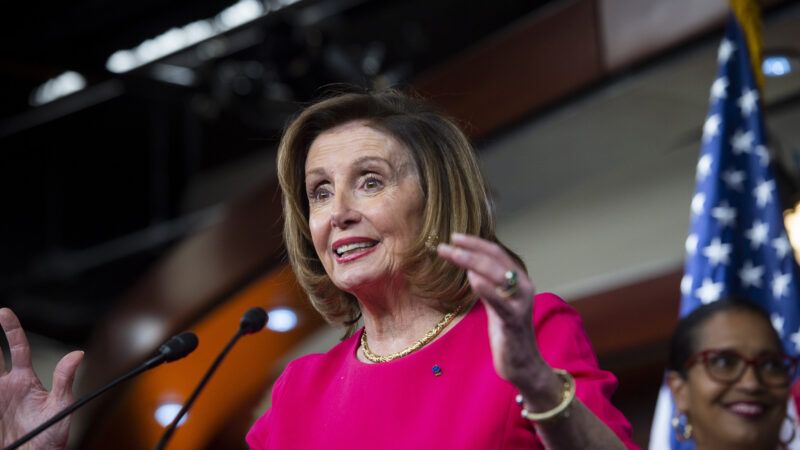San Francisco Archbishop Bars Nancy Pelosi From Communion Over Abortion Stance
This has nothing to do with the separation of church and state.

San Francisco Archbishop Salvatore Cordileone provoked howls of outrage Friday when he announced that Speaker of the House Nancy Pelosi (D–Calif.) may not present herself for Holy Communion, the central sacrament of Catholic life, because of her position on abortion rights. Democratic politicians and a chorus of cable pundits have since argued that the prelate should stick to religion and have the good sense to stay out of politics.
Religious believers have as much right to civic engagement in the United States as anyone. But Cordileone's move to bar Pelosi from the Eucharist actually had a religious motivation: his desire, as her pastor, to bring about repentance from a position that he says imperils her soul.
The idea that Cordileone is trying to punish Pelosi for her political beliefs is flawed on two levels.
First, the prohibition on receiving communion isn't a punishment at all. In church teaching, it exists to prevent the speaker from the spiritual harm of taking communion in a state of grave sin. The goal is reconciliation, not retribution.
The archbishop also argues that Pelosi—by stepping out of communion with her church on a critical moral issue, then lining up to receive a symbol of that communion on Sunday morning—acts in a way that could cause other Catholics to follow her into error. Under Catholic doctrine, Cordileone is a shepherd responsible for the souls of his flock and had an obligation to respond for their sake.
The archbishop's announcement notes that he has made frequent efforts to avoid a public confrontation over all this. He says his overtures toward a private, pastoral meeting with Pelosi have been rebuffed, his invitations ignored.
Second, when Pelosi works to uphold a right to abortion, she runs directly contrary to the Catholic Church's teaching that abortion is the deliberate taking of an innocent human life. This isn't a mere political belief. It also isn't, despite what some claim, a religious belief; it is a moral judgment, one shared by many atheists. But for a Catholic, openly persevering in such a view does have religious consequences, and a person is not immunized from those consequences just because she happens to be a member of the political class.
In fact, it is Pelosi who has made her religion a matter of politics—at least when it proves politically convenient.
Pelosi is a practicing Catholic, and we do not question the sincerity of her faith. But there is an inconsistency worth noting. She is glad to fly to Rome for pictures with the pope and to describe herself on the campaign trail as devout. She is glad to quote the Gospel of Matthew, as she did this week when advocating for a Ukrainian funding bill, or to take up the cause of an arrested 90-year-old cardinal when the Beijing authorities put him to the screws. But if that Gospel or that cardinal have anything to say about abortion, Pelosi will insist that Catholic doctrine has no place in political discourse, that religious sensibilities "shouldn't have an impact on a woman's right to choose."
Pro-choice Catholic politicians have long argued that their "personal opposition" to abortion, if indeed they have any, has no bearing on their decision about whether the practice should be legally protected. A divorce between political discourse and the sources of moral wisdom, we're told, is the meaning of the "separation of church and state."
But that's not what the First Amendment says. It stops the government from establishing a state church. The separation of church and state runs between institutions, not between people grappling with moral issues. Politics does not get to declare eminent domain over issues of public morality and evict religion from the conversation.
Politicians, especially in a democracy, do not exist as a class apart. They are representative members of the communities from which they come—communities with their own identities. Membership of a church doesn't exclude Pelosi, or anyone else, from participating in political life or from civic responsibilities. And participating in politics does not remove a person from her church or strip her of the rights, responsibilities, and obligations of membership in that community.
Cordileone can't tell Pelosi how to vote and hasn't tried to. But the archbishop is responsible for shepherding his flock in line with Catholic doctrine—even when they wander as far as Washington, D.C.


Show Comments (511)